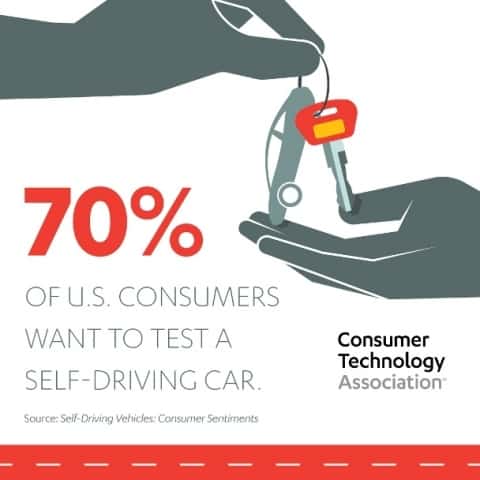 Ah consumer studies about self-driving cars, the last study from Kelley Blue Book found that Americans are most comfortable with the vehicles currently on the road today, believing that they are significantly safer than models with a higher level of autonomy. A University of Michigan Transportation Research Institute study in May found about two-thirds of drivers were concerned about riding in completely self-driving vehicles. CTA’s latest study finds more support for self-driving cars in survey of 2,000 consumers.
Ah consumer studies about self-driving cars, the last study from Kelley Blue Book found that Americans are most comfortable with the vehicles currently on the road today, believing that they are significantly safer than models with a higher level of autonomy. A University of Michigan Transportation Research Institute study in May found about two-thirds of drivers were concerned about riding in completely self-driving vehicles. CTA’s latest study finds more support for self-driving cars in survey of 2,000 consumers.
The Consumer Technology Association (CTA) found three in four consuemrs are excited about the many benefits driverless vehicles can offer, and almost two-thirds want to swap their current cars for completely self-driving vehicles.
The report Self-Driving Vehicles: Consumer Sentiments also finds almost all drivers (93 percent) who use existing driver-assist features such as parking assist, adaptive cruise control and collision avoidance appreciate the usefulness of these driving technology innovations.
According to the CTA research, the popularity of driver-assist technology already available to consumers is sky-high. Almost all consumers (96 percent) like or love automatic parking-assist capabilities, and 94 percent feel the same about collision avoidance systems. Perhaps most indicative of this sector’s potential, half of all non-users want to upgrade to driver-assist technologies. Additionally, data alert systems enjoy immense consumer support – 97 percent of consumers are satisfied with their navigation assistance technology, and 94 percent like or love car maintenance alerts.
The CTA study also shows four in five consumers recognize the potential benefits driverless technology can offer. Consumers are most excited about self-driving technology’s ability to:
- Reduce accidents caused by aggressive driving or driving under the influence of drugs or alcohol (82 percent).
- Provide monetary savings on car insurance (80 percent).
- Prevent up to 90 percent of driving-related accidents and injuries on U.S. roads (79 percent).
- Offer new mobility options to people with disabilities (78 percent).
In addition to the 62 percent of consumers who are interested in replacing their current cars or trucks with completely self-driving vehicles, CTA research finds 70 percent of consumers have a strong interest in testing a driverless car for themselves. This enthusiasm indicates a much higher level of consumer interest in driverless innovation than previous studies.
Self-Driving Vehicles: Consumer Sentiments was designed and formulated by CTA, the most comprehensive source of sales data, forecasts, consumer research and historical trends for the consumer technology industry. CTA fielded the survey in July, 2016 using an online sample of 2,001 U.S. adults 18-years-of-age and older who drove a car or truck in the past month, achieving a margin of error of plus/minus 2.6 percent.